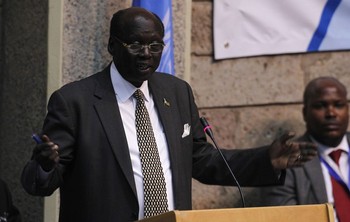S. Sudan pushes for AU’s rejection of proposed sanctions
January 30, 2016 (JUBA) – South Sudan government said it was lobbying leaders attending the African Union heads of states summit to include in the final communiqué a text rejecting imposition of sanctions on officials seen as obstacles to its peace process.

Discussions, he told Sudan Tribune, also focused what role Juba expected African leaders to play in their capacities to convince and halt western nations and the United Nations Security Council from imposing sanctions.
“My colleagues handling the peace process and I have come as special delegation with special message from the president to deliver to African leaders attending the summit. We have met and held talks with many leaders who have positive views and perspectives,” said Marial.
“Many of them appreciated the way the government was handling the situation especially with the commitment of the government to implement the peace”, he added.
According to the foreign affairs minister, the South Sudanese government was seriously looking for support to implement peace, than the sanctions.
“South Sudan is like a child trying to walk and when child stumbles, people don’t laugh, they don’t condemn the child. Instead they rush toward the child and provide the guide to walk. This is what the current situation requires. It does not need sanctions and this is the message we are sharing with our African brothers whom we would like to stand with us as the government and people of South Sudan,” said Marial.
“Sanctions will not solve anything. Instead they will exacerbate and undermine the process”, he added.
A UN panel of experts, in a report issued last week, recommended that both South Sudan’s president Salva Kiir and the armed opposition leader, Riek Machar qualify for sanctions owing to the fact that forces within their control committed war crimes and crimes against humanity on civilians.
Analysts, civil society activists, as well as the UN panel of experts have observed that the August 2015 peace agreement has “failed to result in a meaningful reduction in violence” and both sides have demonstrated “a lack of political will” to put aside their differences and fully commit to the process envisioned in the peace agreement.
According to the 55-page report from the UN experts, “there is clear and convincing evidence that most of the acts of violence committed during the war, including the targeting of civilians and violations of international humanitarian law and international human rights law, have been directed by or undertaken with the knowledge of senior individuals at the highest levels of the government and within the opposition.”
They document further recommended that an arms embargo would be critical to promoting end to the violence in the world’s youngest nation.
The report accuses officials in president Kiir’s government, including the chief of staff of South Sudan army, Paul Malong Awan and the director general of the national security service’s internal security bureau, Akol Koor Kuc, of “waging an aggressive war involving the targeting of civilians and extensive destruction of communities.”
It said Machar “continues to seek funding and weapons to prosecute the war and to further his personal political ambitions at the expense of peace.”
However, the long-term implications of these actions for the conflict is menacing, with the panel concluding that South Sudanese increasingly perceive the conflict “as a zero-sum struggle where the exclusion of competing tribes from political power and the monopolization of resources for personal gain have become the principal aims of the belligerents.”
The report, meanwhile, recommended actions needed with immediate effect to prevent this conflict from becoming a generations-long struggle.
It urged the United States needs to take immediate steps to move the two warring sides toward peace. The role of the US, according to the report, should including pressing for an immediate arms embargo at the UN Security Council against both sides, beginning consultations on individual sanctions against senior leaders who have command responsibility and who have directed violent acts against civilians, or have had knowledge that such acts have happened under their command, and imposing sanctions if the parties do not comply with their obligations under the agreement.
It said the African Union be pressed to establish the hybrid tribunal on South Sudan called for in the accord, investigate senior leaders responsible for the violence, and support other transitional justice mechanisms as well as the independence and security of civil society against pressures by all sides in an environment that is rapidly closing.
But while efforts at imposing an arms embargo have been thwarted in the past by China and Russia, despite clear evidence that the sides are buying or attempting to buy advanced weapons such as helicopter gunships and shoulder-fired anti-aircraft missiles is a sure sign that an arms embargo is needed and could be effective, no alternative options have so far emerged to end the conflict.
In addition, objections that an arms embargo would unfairly target the government are undermined by the report, which states that the purchase of helicopter gunships and other military equipment and supplies has emboldened those in the government seeking a military solution to the conflict, and the overall sense that the government bears greater responsibility for the violence. Even limiting the importation of ammunition could help reduce deadly violence in a country awash with small arms.
(ST)
